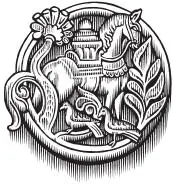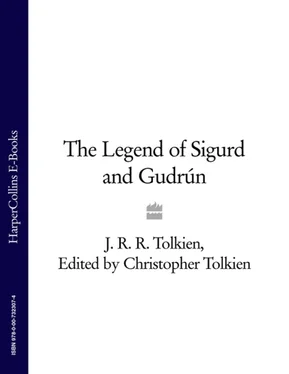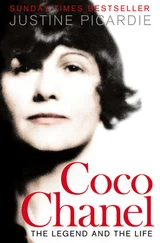J. Tolkien - The Legend of Sigurd and Gudrún
Здесь есть возможность читать онлайн «J. Tolkien - The Legend of Sigurd and Gudrún» — ознакомительный отрывок электронной книги совершенно бесплатно, а после прочтения отрывка купить полную версию. В некоторых случаях можно слушать аудио, скачать через торрент в формате fb2 и присутствует краткое содержание. Жанр: Старинная литература, на английском языке. Описание произведения, (предисловие) а так же отзывы посетителей доступны на портале библиотеки ЛибКат.
- Название:The Legend of Sigurd and Gudrún
- Автор:
- Жанр:
- Год:неизвестен
- ISBN:нет данных
- Рейтинг книги:5 / 5. Голосов: 1
-
Избранное:Добавить в избранное
- Отзывы:
-
Ваша оценка:
- 100
- 1
- 2
- 3
- 4
- 5
The Legend of Sigurd and Gudrún: краткое содержание, описание и аннотация
Предлагаем к чтению аннотацию, описание, краткое содержание или предисловие (зависит от того, что написал сам автор книги «The Legend of Sigurd and Gudrún»). Если вы не нашли необходимую информацию о книге — напишите в комментариях, мы постараемся отыскать её.
The Legend of Sigurd and Gudrún — читать онлайн ознакомительный отрывок
Ниже представлен текст книги, разбитый по страницам. Система сохранения места последней прочитанной страницы, позволяет с удобством читать онлайн бесплатно книгу «The Legend of Sigurd and Gudrún», без необходимости каждый раз заново искать на чём Вы остановились. Поставьте закладку, и сможете в любой момент перейти на страницу, на которой закончили чтение.
Интервал:
Закладка:
139
An ancient adder
evil-swollen,
to breast it bent
and bitter stung him.
Loud cried Gunnar
life forsaking;
harp fell silent,
and heart was still.
140
To the queen that cry came
clear and piercing;
aghast she sat
in guarded bower.
Erp and Eitill
eager called she:
dark their locks were,
dark their glances.
*
141
Pyres they builded
proud and stately;
Hunland’s champions
there high upraised.
A pyre they builded
on the plain standing;
there naked lay
the Niflung lords.
142
Flames were mounting,
fire was roaring,
reek was swirling
ringed with tumult.
Smoke was fading,
sunk was burning;
windblown ashes
were wafted cold.
143
A hall was thronging,
Huns were drinking
the funeral feast
of fallen men.
Foes were vanquished,
fire had burned them;
now Atli was lord
of East and West.
144
Wealth he dealt there,
wounds requiting,
worthy weregild
of warriors slain.
Loud they praised him;
long the drinking,
wild grew the words
of the wine-bemused.
145
Gudrún came forth
goblets bearing:
Gudrún
‘Hail, O Hun-king,
health I bring thee!’
Deep drank Atli,
drained them laughing:
though gold he missed,
yet was Gunnar dead.
Gudrún
146
‘Hail, O Hun-king,
hear me speaking:
My brethren are slain
that I begged of thee.
Erp and Eitill
dost thou ask to look on?
Ask no longer –
their end hath come!
147
Their hearts thou tastest
with honey mingled,
their blood was blent
in the bowls I gave;
those bowls their skulls
bound with silver,
their bones thy hounds
have burst with teeth.’
148
There awful cries
of anguish woke;
their heads men hid
their horror shrouding.
Pale grew Atli,
as one poison-sick,
on his face crashed he
fallen swooning.
149
To bed they brought him
in bower empty,
laid him and left him
to loathsome dream.
Women were wailing,
wolves were howling,
hounds were baying
the hornéd moon.
150
In came Gudrún
with ghastly eyes,
darkly mantled,
dire of purpose.
Gudrún
‘Wake thou, woeful!
Wake from dreaming!’
In his breast the knife
she bitter drave it.
Atli
151
‘Grímhild’s daughter
ghastly-handed,
hounds should tear thee
and to hell send thee!
Stoned and branded
at the stake living
thou shouldst burn and wither
thou born of witch!’
152
Gudrún mocked him,
gasping left him.
Gudrún
‘The doom of burning
is dight for thee!
On pyre the corpse is,
prepared the faggot!
so Atli passeth
earth forsaking.’
153
Fires she kindled,
flames she brandished;
the house was roaring,
hounds were yelping.
Timbers crumbled,
trees and rafters;
there sank and died
slaves and maidens.
154
Smoke was swirling
over sleeping town,
light was lifted
over land and tree.
Women were weeping,
wolves were yammering,
hounds were howling
in the Hun-kingdom.
155
Thus Atli ended
earth forsaking,
to the Niflungs’ bane
the night was come;
of Völsung, Niflung,
of vows broken,
of woe and valour
are the words ended.
*
156
While world lasteth
shall the words linger,
while men are mindful
of the mighty days.
The woe of Gudrún
while world lasteth
till end of days
all shall hearken.
157
Her mind wavered,
her mood grew cold;
her heart withered
and hate sickened.
Life she hated,
yet life took not,
witless wandering
in the woods alone.
158
Over wan rivers,
over woods and forests,
over rocks she roamed
to the roaring sea.
In the waves she cast her,
the waves spurned her;
by the waves sitting
she woe bemoaned.
Gudrún
159
‘Of gold were the days,
gleaming silver,
silver gleaming
ere Sigurd came.
A maid was I then,
a maiden fair;
only dreams vexed me,
dreams of evil.
160
Fell sorrows five
hath fate sent me:
they slew Sigurd,
my sorrow greatest.
In evil loathing
to Atli me gave:
too long lasting
my life’s disease.
161
The heart of Högni
they hewed living:
my heart it hardened,
my hardest woe.
Gunnar heard I
in the grave crying:
my grief most grim
was that ghastly voice.
162
My sons I slew
seared with madness:
keen it bites me
most clinging woe.
There sits beside me
son nor daughter;
the world is empty,
the waves are cold.
163
They slew Sigurd:
my sorrow deepest,
my life’s loathing,
my life’s disease.
Sigurd, Sigurd,
on swift Grani
lay saddle and bridle
and seek for me!
164
Rememberest thou
what on marriage-bed
in love we pledged,
as we laid us down? –
the light I would leave
to look for thee,
from hell thou wouldst ride
and haste to me!’
165
In the waves she cast her,
the waves took her;
in the wan water
her woe was drowned.
While the world lasteth
woe of Gudrún
till the end of days
all shall hearken.
*
166
Thus glory endeth,
and gold fadeth,
on noise and clamours
the night falleth.
Lift up your hearts,
lords and maidens
for the song of sorrow
that was sung of old.
COMMENTARY
on
GUÐRÚNARKVIÐA EN NÝJA

COMMENTARY
on
GUÐRÚNARKVIÐA EN NÝJA
In this commentary Guðrúnarkviða en Nýja is referred to as ‘the Lay of Gudrún’, or where no confusion is possible as ‘the Lay’, and Völsungakviða en Nýja as ‘the Lay of the Völsungs’. As there are no sections in this poem, references are made simply by the numbers of the stanzas.
The subordinate title Dráp Niflunga means ‘The Slaying of the Niflungs’: on this name see the Lay of the Völsungs, VII.8 and note.
The relation of the Lay of Gudrún to its ancient sources is not essentially different from that of the Lay of the Völsungs, but in this case the sources are very largely extant in the poems of the Edda, and the Völsunga Saga is of far less importance. In its content the Lay of Gudrún is essentially a complex interweaving of the Eddaic poems Atlakviða and Atlamál , together with some wholly independent developments.
My father devoted much time and thought to Atlakviða, and prepared a very detailed commentary (the basis for lectures and seminars) on this extraordinarily difficult text. It is a poem that he much admired. Despite its condition, ‘we are in the presence (he wrote) of great poetry that can still move us as poetry. Its style is universally and rightly praised: rapid, terse, vigorous – while maintaining, within its narrow limits, characterization. The poet who wrote it knew how to produce the grim and deadly atmosphere his theme demanded. It lives in the memory as one of the things in the Edda most instinct with that demonic energy and force which one finds in Old Norse verse.’
Читать дальшеИнтервал:
Закладка:
Похожие книги на «The Legend of Sigurd and Gudrún»
Представляем Вашему вниманию похожие книги на «The Legend of Sigurd and Gudrún» списком для выбора. Мы отобрали схожую по названию и смыслу литературу в надежде предоставить читателям больше вариантов отыскать новые, интересные, ещё непрочитанные произведения.
Обсуждение, отзывы о книге «The Legend of Sigurd and Gudrún» и просто собственные мнения читателей. Оставьте ваши комментарии, напишите, что Вы думаете о произведении, его смысле или главных героях. Укажите что конкретно понравилось, а что нет, и почему Вы так считаете.












